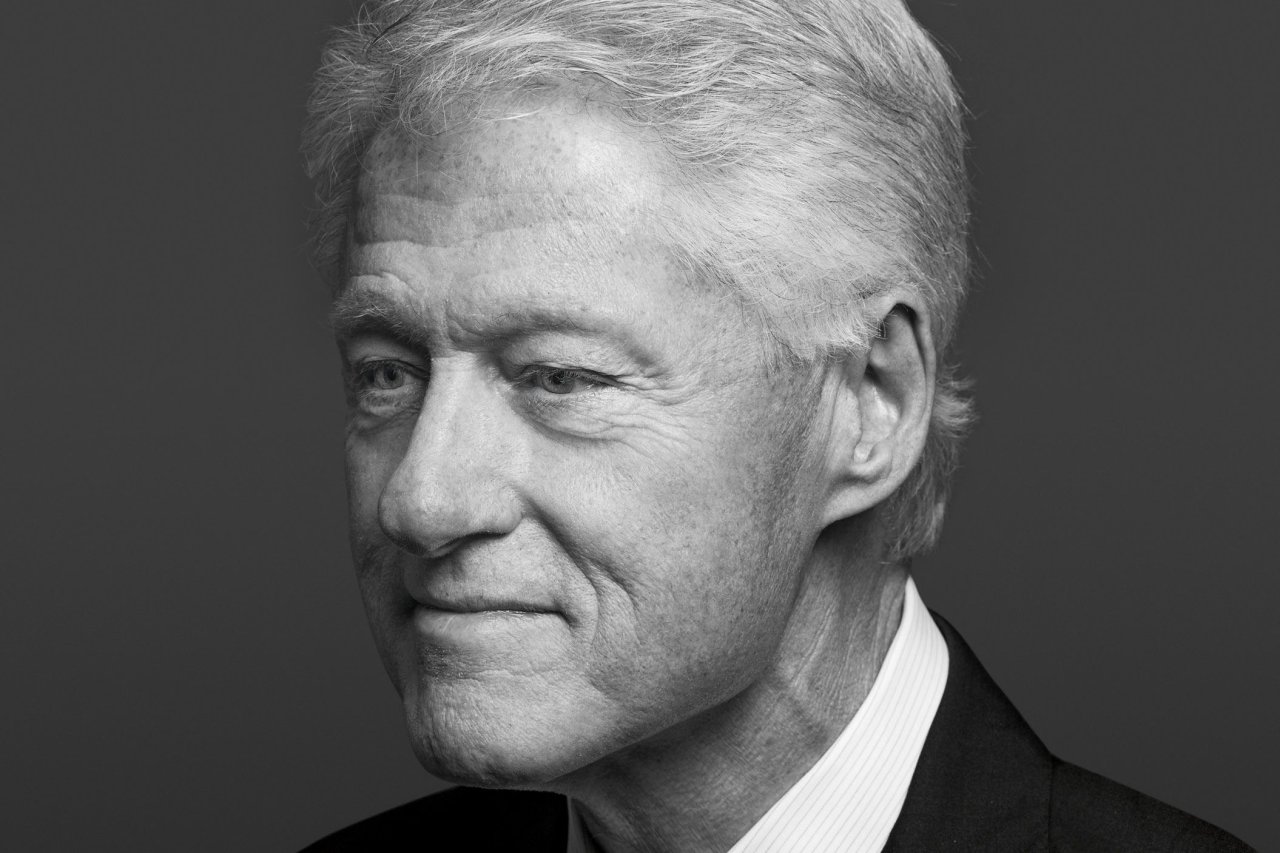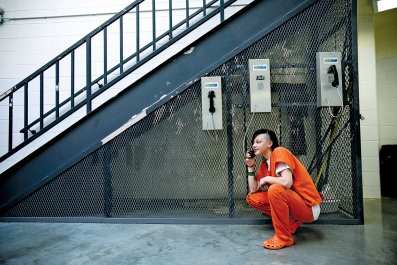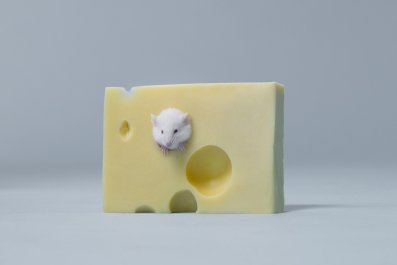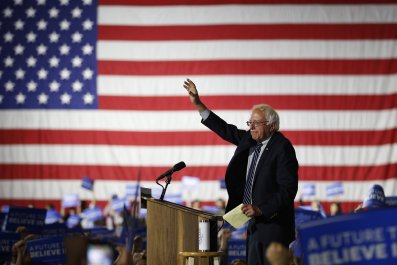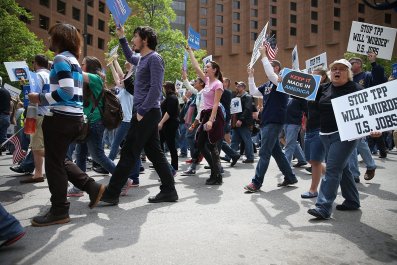It could go this way: The FLOTUS office has been converted to a man cave. The boudoir-peach paint is covered with dark paneling. Heavy green drapes block out the sun, the better to channel-surf on that 6-foot flat-screen. Sometimes there's a sweaty towel draped over the treadmill, since the first man exercises at odd hours and the staff can't keep up. There's a dog bed in a corner, and an antique brass spittoon welcomes the ashes of anyone who fires up a cigar (the host stopped lighting up years ago but keeps some Cohibas around for his bros).
There's beer in the mini-fridge and Scotch and a bucket of ice on the trolley. He can often be found jawing in this dark den with congressional leaders who need a little Southern charm to get behind the Hillary Clinton stimulus package, or watching soccer with buddies like Irish telecom magnate Denis O'Brien and Canadian mining billionaire Frank Giustra, or sharing dirty jokes with Putin, Erdogan, Hollande and any other male world leader eager to chill after his official meetings with the no-nonsense president of the United States.
Or it could go like this: The peach paint stays. The first man eases himself behind the pale desk where Jackie Kennedy once penned thank-you notes. (He picked it out himself because of his admiration for JFK.) He runs his eyes down a briefing paper on the day's activities: morning photo ops with the wives of the leaders of the Caribbean Basin, a vegan lunch to host at a middle school in Anacostia for his Childhood Obesity Awareness Initiative, some spinning time (he took Michelle Obama's spot at the gym) and finally an evening at the Kennedy Center to honor the last performance of the American Ballet Theatre's retiring prima ballerina. Despite his reputation, the first man is an abstemious and quiet fellow now and enjoys checking the lists the White House social secretary sends him to sign off on—menus and floral arrangements, although he refuses to be involved in the negotiations over the new White House china pattern.
Hillary Clinton has already made history as the first woman who will be nominated by a major political party to run for president of the United States. It's a historic challenge, but if she wins, she instantly confronts another vexing dilemma: What does her husband do for the next four years? Will he be a White Hausfrau or a POTUS without portfolio? The enormous question of "What to do about Bill?" has been hanging over Hillary's campaign for the White House since it started. No one knows the answer. The only sure thing is that Bill will be the most powerful first spouse in American history. And very possibly the most successful, or the most destructive.
As popular as Bill is with many Americans and with people around the world, most of the baggage Hillary hauls around—besides Benghazi and those pesky emails—bears the WJC monogram. President William Jefferson Clinton's welfare reform made life worse for the very poor. His criminal justice reforms threw a generation of black men behind bars. His cash-raking Clinton Foundation has an appearance of conflict of interest. And the whole sex addiction thang, the Gennifers and Monicas and those post-presidential joyrides on the babe-filled private jets (one nicknamed "Air Fuck One")—she has been made to answer for all of it. And will surely be flayed for it many times by the Republican nominee during their full-contact debates.
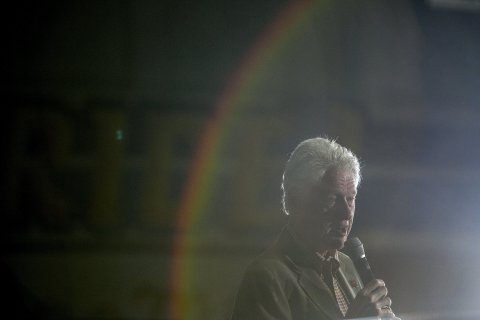
Donald Trump already has a general answer to this question: He doesn't think husbands should let their wives work. But Bill and Hillary have never been traditional, and they have never listened to Trump, except when cajoling a donor check out of him.
If Hillary wins in November, everybody will be making it up as they go along in the first gender-flipped White House. The conundrum of "What to do about Bill?" is so controversial and complicated that it needs its own flowchart and PowerPoint presentation—and probably, somewhere in the basement of the Brooklyn HQ of Hillary for President, a team of consultants is working on that right now.
Protocol: Who Picks the Flowers?
No one in Washington even seems to know what to call him, other than "Bill." What will the official announcers at events like state dinners and the State of the Union intone when the Clintons walk into the room? Ladies and gentlemen: Madam and Mr. President of the United States? President Clinton and former President Clinton. Or how 'bout just Mr. and Mrs. President Clinton.
Bill has jokingly suggested he be called Adam, as in the first man, inspiring tweeters to suggest that the moniker would give him the right to "go forth and multiply," so maybe not.
"Once you've served as president, that is your title for life," White House historian William Seale tells Newsweek. "I would think in business and out in public he would be Mr. President, as he's certainly earned it. And in connection with her, they would be President Clinton and Mr. Clinton."
Once they figure out what to call him, there's the question of where to put him. White House real estate is limited, and its allocation very traditional: It's always been men in the West Wing, ladies to the East. Those who know him can't imagine Bill being content in the traditional East Wing spousal office. But he can't take the office that abuts the Oval Office—it goes to the vice president.
Once the Clintons are settled in, everyone agrees it's highly unlikely Bill will be "managing the house," that big, traditionally female (and socially delicate) job that includes many official and unofficial activities—from greeting the wives of visiting leaders to planning and hosting state dinners and hosting the myriad tiny official events in the garden or mansion—that fill a first lady's calendar.
"The first lady role is a huge job, and it has evolved over time and is likely to evolve even more in the years ahead," Melanne Verveer, Hillary's chief of staff in the 1990s, tells Newsweek. But the job of managing the White House has not always been handed off to a female. The job title "first lady" didn't come into use until after Mary Lincoln and only became truly popular during the Kennedy administration, even though Jackie Kennedy despised it. Until President William Howard Taft, the president's secretary, always a man, tended to White House staff and social engagements, according to Searle. Perhaps Hillary and Bill will get themselves a super-high-level butler to handle such matters.
There's one other possibility: Hillary might just end up multitasking, like so many other working women. "I think she's feminine enough to want to check the flowers," says Elaine Kamarck, who served in the Clinton White House as a senior adviser to Vice President Al Gore. "It takes less time to do that than it takes for a man to watch a basketball game."
Power Sharing: In the Crosshairs of a Triangle
Hillary has said—only half in jest, it seems—that she was tempted to make Bill her vice president. "He would be good, but he's not eligible under the Constitution," she told Extra's Mario Lopez. But she added, "It has crossed my mind."
Whoever she picks to be her vice president better be ready for some Olympic-level triangulation. Before Bill and Hillary even moved into the White House back in 1993, Gore often found himself the odd man out. During the transition, Gore and Hillary regularly competed for Bill's attention, and she invariably won. He wasn't even consulted when Bill appointed Hillary to come up with a national health care plan. The Clintons didn't exactly ignore Gore, but from the beginning everyone understood that Bill didn't decide anything without consulting Hillary. Back then, the White House staff jokingly referred to Hillary as "the Supreme Court."
"We would always say, 'Has the Supreme Court been consulted?'" Bill's press secretary Dee Dee Myers says. "Whenever Bill said he was going up to the residence, the staff knew he was going to talk to Hillary and might come down with a different plan."
"They really were a partnership," White House Counsel Bernard Nussbaum told author Sally Bedell Smith. "She was the absolutely necessary person he had to have to bounce things up against, and he was that for her. I sensed a tremendous need for each other. They didn't have to see each other, but they would talk continually every day."
In a Hillary White House, there would again be three very powerful people at the top, with their own staffs and competing agendas. But longtime Clinton consultant Paul Begala says this won't be an issue because presidential spouses always wield power. "President Clinton and Hillary have worked this out over decades: first with her as supportive spouse and irreplaceable adviser, now with HRC as the secretary of state and soon as president. The truth is, he is a pretty easy guy to get along with, and Madam President's VP and staff will find that to be the case. Having so much talent on your team is, as WJC himself would say, 'a high-class problem.'"
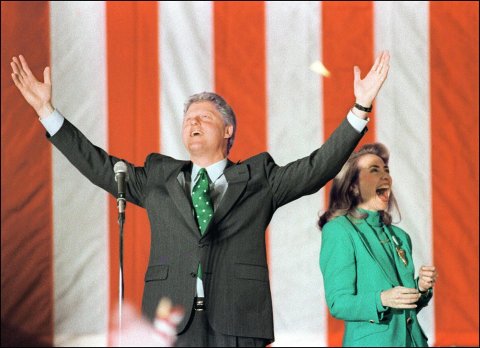
The two-for-the-price-of-one pitch backfired on Hillary in Bill's first campaign for president, and she has been vague this time around on what she would do with her spouse, but she definitely plans to "take him out of retirement," as she put it. There's disagreement on whether giving him an official job is a good idea. Says Kamarck, "It's generally conceded that giving her a defined project [in his administration] was a mistake, and I hope she would exercise the same caution as the last two presidents [did] and not give the spouse a job.
"You can't fire your spouse."
Projects: Peace Envoy or Mr. Fat-Buster?
Hillary has spoken a few times of her plans for Bill if they get back to the White House, always in passing and always keeping it vague. Most recently, she suggested she will put him to work helping Americans get jobs. During the Kentucky primary in May, she suggested he would be "in charge of revitalizing the economy. Especially in places like coal country and inner cities and other parts of our country that have really been left out."
Campaigning in South Carolina last year, she said her husband would be among "the very best advisers that I can possibly have." Asked whether he'd have a specific role, she said that because of "what was accomplished under my husband's leadership in the '90s—especially when it came to raising incomes for everybody and lifting more people out of poverty than at any time in recent history—you bet."
Bill left the country in great economic shape, with a balanced budget, 22.7 million new jobs and 7.7 million fewer people in poverty than when he took the oath of office. And he has genuine concern for people hurting for work. As governor of Arkansas, he did a lot of smokestack chasing. "Whatever people think of the Clintons, maybe they believe that he can bring jobs to Appalachia," says a former Clinton White House aide. "Almost everyone admits he cares about people without jobs."
Ron Fournier, the National Journal writer who has covered the Clintons since their Arkansas years, doesn't think anyone should take such talk seriously. He thinks Hillary mentions Bill's possible role as a play for votes in states where he is beloved. "I think they looked at their internal polling and saw she was losing Kentucky and he's always done well there. And now we've forgotten she even said it."
Hillary has also suggested Bill will be dispatched on "missions...because he's just unique in the world in being able to do things for our country." Some Clinton insiders who talked to Newsweek suggest Bill would make a great Middle East envoy, giving him a second chance to craft a solution to the Israeli-Palestinian conflict, which eluded him after intense efforts in his second term. But that presumes he still has the boundless energy required for black belt shuttle diplomacy.
Other special missions could benefit from his post-presidential experience at the Clinton Foundation fighting AIDS, helping victims of natural disasters like those in Haiti and post-tsunami Indonesia, or even working on global climate change and the environment. Although Gore is more often associated with that topic, President Bill issued a regulation prohibiting commercial logging and road construction on almost a third—58 million acres—of America's forests in his administration's waning days, prompting historian Douglas Brinkley to say that after Theodore Roosevelt, Franklin Roosevelt and Jimmy Carter, "he's probably our greatest environmental president."
Fixing the Middle East or the U.S. economy could be an overwhelming task for even Superman, much less a man of 70 who has looked increasingly frail in recent years. If Bill wanted to watch his blood pressure, he could devote himself to a more traditionally first lady–ish "awareness" campaign with which he is already involved: fighting childhood obesity. In 2005, after his triple bypass, Bill announced he was partnering with the American Heart Association to create programs to do just that. He knows whereof he speaks: At age 15, he weighed 210 pounds and was only 5 feet 9 inches, and while running for president, he weighed as much as 226 pounds. As Arkansas governor, and even in his presidency, he was a Big Mac Daddy, famous for making pit stops at Mickey D's during his morning jogs in Little Rock.
If he wants to scare overweight kids "straight," he can show them the photos the press ran of him back then, his flabby, pasty thighs on display in his too-short running shorts.
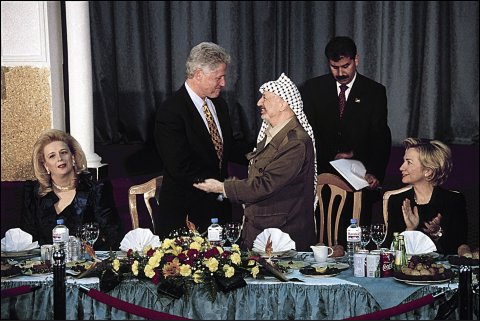
Pin Money: Working Outside the (White) House
If Hillary's elected, the White House is going to look a lot like homes in elite America: double income, white and wealthy. The Clintons are part of a new breed, the global power couple, where the husband is as likely to be an ambassador as the wife is to be in the CIA, or the wife is running a desk at Goldman Sachs while her husband runs for a presidential nomination.
Bill has been raking it in since he left 1600 Pennsylvania Avenue. He earned more than $104 million from speeches between 2001 and 2012 and founded a global charity that has hauled in $3 billion in a decade. That foundation has done tremendous good fighting AIDS, educating women and girls in impoverished nations and helping people after disasters like the Haiti earthquake. Bill has said he will turn down paid speaking gigs while his wife is in the White House, but neither he nor Hillary have suggested that he will relinquish his role at the Clinton Foundation.
If he maintains an office, and a job, outside the White House, he will be the first presidential spouse in history to work outside the home. But many first men all over the world—and in governors' mansions in the United States—do not become stay-at-home dads or leave their day jobs to garden and shake up cocktails for their wives after work. Margaret Thatcher's husband, Denis, was a businessman and millionaire who financed her training as a barrister and spent his years at 10 Downing Street as a well-known right-winger who advised his wife on financial issues. German Chancellor Angela Merkel's husband, Joachim Sauer, is sort of the anti-Bill, a chemistry nerd and full professor at Humboldt University of Berlin who reportedly watched his wife's inauguration from inside his lab.
They won't like the comparison, but the Clintons are most like some of the husband-wife teams in South America. Back in the 1940s and '50s, Argentina's Juan and Eva Perón were a true political team: While he was president, she ran the Ministries of Labor and Health, then founded the first large-scale female political party and ran for president, before dying of cancer at age 33. Argentina's last president, Cristina Elisabet Fernández de Kirchner, followed her husband, Néstor Kirchner, into the presidency.
The husbands of America's female governors have kept working and are mostly kept out of sight. In Michigan, former Governor Jennifer Granholm's husband, Daniel Mulhern, a Harvard-minted lawyer and an author, had a successful leadership company, the Mulhern Hastings Group, which he left when she became governor in 2002. Nikki Haley's husband, Michael Haley, shipped out for a yearlong tour of duty in Afghanistan as a captain in the South Carolina National Guard in January 2012, while she was that state's governor. In Helmand Province, his fellow soldiers nicknamed him FGOSC (for "first gentleman of South Carolina" and pronounced "fuh GOSK," like FLOTUS). Todd Palin took a leave from his 18-year job working on BP's oil fields to avoid a conflict of interest when Sarah Palin was elected governor of Alaska.
The prospect of Bill maintaining his position at the Clinton Foundation makes some of Hillary's supporters nervous, while foes can't wait to call for investigations if the Clintons get back in the White House. The foundation's $3 billion haul is rife with appearances of conflict of interest and dubious associations with leaders who laugh at human rights. Some major donors to the foundation are private businessmen who benefited enormously from the doors Bill opened for them in resource-rich developing nations.
Bill can legally keep running the foundation if Hillary's elected—he is not a federal employee (and being the spouse of one wouldn't matter). But a few American companies have been charged under the Foreign Corrupt Practices Act for doing exactly what the Clinton Foundation asks wealthy donors to do: make donations to charities connected to politicians. Pharma giant Eli Lilly, which donated to a charity in Poland connected to the health minister, was charged under the FCPA and settled.
"He has protested that he has to pay the bills," Peter Schweizer, author of Clinton Cash, a comprehensive summary of some of the troubling ties, tells Newsweek. "I think they are in a financial position where they can pay their bills. The Clinton Foundation needs to be turned over to independent management, with no Bill involvement in fundraising or programmatic issues."
A former Clinton White House aide agrees. "They need a clean break. Even their daughter might have to break [from the foundation]. I would simply cut all family ties to it. It's the only sane thing to do."
But others think Bill should keep on keepin' on. "The foundation and its work must continue," says Begala. "It is keeping millions of people with HIV/AIDS alive in Africa. You may see Chelsea continue to assert more leadership at the foundation, but it would be a tragedy if the foundation's work were to be curtailed because of cheap political attacks."
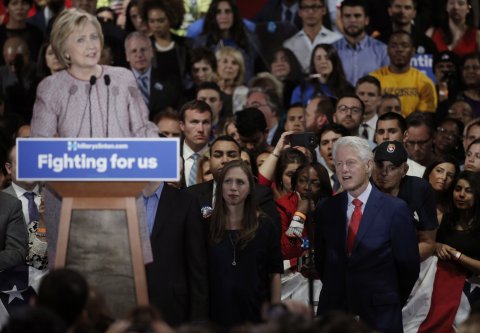
Body Politics: 'Would You Hold It Against Me?'
Spending their golden years together in the White House looks like a happily-ever-after, picture-book ending to a long and stormy tale for Bill and Hillary. Bill did famously say that when he married her, he disappointed his mother, who had hoped for a beauty queen, but that he couldn't imagine growing old with anyone else without getting bored. He's talked about his "endless conversation" with Hillary, and if she's elected they will be having it from rocking chairs at the top of the world. Whatever the cynics say, they were once in love. A friend from their early years together told author David Maraniss that young Hillary adored him "with a romantic, poetic, teenage love."
But when they left the White House in their early middle age, Bill was the first president impeached for having sex with an intern, and some of his other infidelities were the subject of litigation. Hillary had stood by her man, like some egghead Tammy Wynette, but she was fuming. There were numerous reports of epic screaming fights in the White House, rows in which she actually wounded him. She once threw a briefing book at Bill in a car but missed and hit a Secret Service agent in the head, says author Ron Kessler. In her book on White House staff, former White House reporter Kate Andersen Brower reported that staffers found blood all over the couple's bed in 1998, around the time of the Lewinsky scandal. (They believed Hillary had bounced a book off the president's head, requiring him to get stitches. He explained the injury by saying he had run into the bathroom door.)
In a book to be published later this month, former Secret Service agent Gary Byrne, who was posted to the Oval Office during Bill's presidency, calls Hillary "erratic, uncontrollable and occasionally violent" and writes that Secret Service agents had discussions about the possibility that they would have to protect Bill from his wife's attacks. Byrne described a 1995 fight between the Clintons that left a light blue vase "smashed to bits" and Bill sporting a "real, live, put-a-steak-on-it black eye."
But it's Bill's behavior, not Hillary's reactions to it, that worries some now. Americans view sexual harassment and sexual assault much differently than they did in 1992, and Clinton foes can't wait to paint the old Hound Dog as a more powerful and better-protected Bill Cosby. The Clintons' War on Women, by political operative Roger Stone, is their playbook, laying out the many allegations, some involving aggressive seduction and even rape. The book includes a quote from no less a psychological expert than former President Gerald Ford, who once said, "He's sick—he's got an addiction. He needs treatment."
After leaving the White House in January 2001, Bill and Hillary basically went their separate ways—she spent more time in D.C. attending to her Senate duties while he worked out of New York. At first, he maintained his aging-player lifestyle, flying around on bachelor billionaires' private jets stocked with nubile young women, including the aircraft that tabloids called the "Lolita Express," owned by convicted pedophile Jeffrey Epstein.
Then he had a triple bypass in 2004; he was hospitalized for related complications in 2005 and hospitalized again in 2010. On the campaign trail, he has looked frail, leading to dire-health rumors, none of which can be substantiated.
Bill has slowed down and is now a vegan, but he's still far from monkish. His close friendship with his Chappaqua, New York, neighbor Julie Tauber McMahon, a wealthy divorced mother of three, has been tabloid fodder for years. Secret Service agents dubbed her "the Energizer" and told Kessler that she hangs around the Clinton house when Hillary is out of town. Bill has publicly denied there was anything improper in a $2 million grant a Clinton Global Initiative-related charity gave Tauber for a green energy initiative.
It's a good bet that female interns in a Hillary White House will be vetted for any predilection for flashing a thong strap, but would the first man even be up for wolfing this time around? "I can't imagine he'd do that, but then again, we couldn't imagine Monica," says a former Clinton White House aide. "His frailty, everyone watching for it—it is difficult to imagine it being a problem. And age takes care of this with men, even with Viagra."
The feminist dream would have been Hillary ditching Bill and riding into the White House alone, proving that, to paraphrase Gloria Steinem, a woman president needs a first man like a fish needs a bicycle. But she stayed with him and she suffered for it, personally and professionally, a role that for women is as old as the Bible. It's ironic that this long-married rich white couple—the very embodiment of traditional and conservative—might be the architects of a radically new post-gender White House. Whatever Hillary decides to do with Bill will be revolutionary, even though she—the suburban, Methodist grandmother from Park Ridge, Illinois—really is not.
Correction: A previous version of this article stated that the Clinton Foundation gave Julie Tauber McMahon a $2 million grant. It has been updated to clarify that a Clinton Global Initiative-related charity issued the grant.


